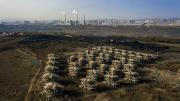Central bankers around the world have been criticized for not raising their interest rates in lockstep with the United States, but Boas professor of international economics Kenneth Rogoff points out that they are responding to varied conditions. In China, Japan, and much of Asia, there is no inflation. (And in Europe, constrained energy supply is driving inflation, not the demand factors and labor constraints prevailing in the United States.)
Looming over the world’s economy is the very different set of circumstances in China, the largest global manufacturer and trading partner in goods. There, after three decades of unprecedented growth, the economy has slowed dramatically. In response, China’s central bank has lowered interest rates fractionally, seeking to encourage domestic growth and to prop up exports by making its products less expensive to trading partners.
Critically, a growing China has for a very long time provided a benign backdrop for central bankers, says Rogoff. “Yes, it created labor and inequality problems,” he acknowledges, as U.S. jobs, particularly in manufacturing, moved there. But it produced “productivity and growth with low inflation for the whole world.” Rogoff wrote about this globalization and global disinflation effect almost 20 years ago, and told some of the leading central bankers that they ought not to take so much credit for the benevolent economic conditions that prevailed for decades.
Now, he fears, China’s growth may slow for an extended period. A political crackdown on big technology firms, over-centralization of the economy, a collapse of the enormous homebuilding and commercial property sectors, and rolling lockdowns—a consequence of “their misguided zero-COVID policy,” Rogoff says—are all hampering growth. “Never underestimate Chinese policymakers,” he says, “but they’re really having a hard time. And if nothing else, that’s likely to make life difficult for central bankers everywhere.”
The Trump administration’s tariffs on foreign goods, Rogoff and others agree, have done little to alter manufacturing and trade relationships, other than to make goods more expensive for American consumers, compounding inflationary forces without changing the balance of trade. Those tariffs on Chinese goods remain in place. Although “we’re not going to start producing washing machines in the U.S. overnight,” notes Rogoff, “seasoned international policymakers think it’s about time the United States started playing tougher with China, which has continued to do what it wants” in terms of economic policy and respect for intellectual property. That makes the Biden administration’s decisions about the China tariffs much harder, he says, because “there’s a real question about what the relationship should be going forward.”
Even as he acknowledges these concerns, and seeks better ways to negotiate economic policy with the People’s Republic, Stanfield professor of international peace Jeffry Frieden argues, “Tariffs are not a very effective tool, and they do hurt consumers, especially in a period when we’re worried about price inflation. It would be a good idea,” he believes, “to get rid of them on both geopolitical and economic grounds.”










